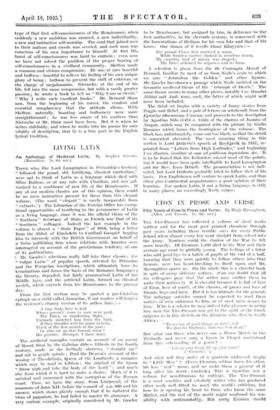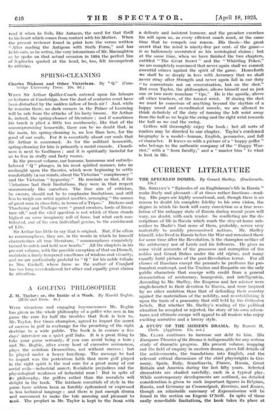ETON IN PROSE AND VERSE
Fifty Years of Eton in Prose and Verse. By Hugh Maenaghten. (Allen and Unwin. 7s. Gd. net.)
Time Vice-Provost has collected a volume of short works written and for the most part printed elsewhere through past years including those terrible ones for every Public School when almost every boy went straight from school into the Army. Nowhere could the shadow of the War be felt more heavily. Of Etonians 1,160 died in the War and their average age nmst be pitifully young. The feelings of a tutor who said .good-bye to a batch of pupils at the end of a half, knowing. that they were quickly to follow others into that furnace, were too heart-breaking to dwell upon, and Mr. Maenaghten spares us. On the whole this is a cheerful book in spite of many obituary notices. (Can one doubt that all his colleagues pray that the writer may outlive them to write their notices ?) It is cheerful because it is full of love of Eton, love of youth, of the classics, of games and love of friends, boys and men. But it is too intimate for the general. The unhappy outsider cannot be expected to read these notices of men unknown to him, or at most mere names to him. If he is a scholar he may indeed take pleasure in seeing how near the Vice-Provost can get to the spirit of I he Greek epigram as in this distich on the Etonians who died in South
Africa
" Posses,,Mg all good things, at did y's cult
We died for England ; that was best of all."
But what can those who never saw a House Match in the Timbralls and never sang a hymn in Chapel understand from this sub-heading of a poem ?—
" Lift up your head, lift up your voice" ("Garnish's ").
And what will they make of a quatrain addressed simply to " Little Man " ? (Even Monians seldom knew his other, his -less " real" name, and we make them a present of it long after his death—Cradoek.) This is therefore not a volume for non-Etonians to criticize. The Vice-Provost is a most sensitive and scholarly writer who has produced other work well fitted to meet the world's criticism, but here he is opening his heart to those who know the same Mother, and the rest of the worhi might confound his sensibility with sentimentality. But every Etonian should
read it when he feels, like Antaeus, the need for that thrill to his heart which comes from contact with his Mother. When the present reviewer found in print here the verses written "After reading the Antigone with Sixth Form," and has in his ears, as he writes, the very intonations of Mr. Macnaghten as he spoke on that actual occasion in 1894 the perfect line of Sophocles quoted at the head, he, too, felt incompetent to criticize.











































 Previous page
Previous page